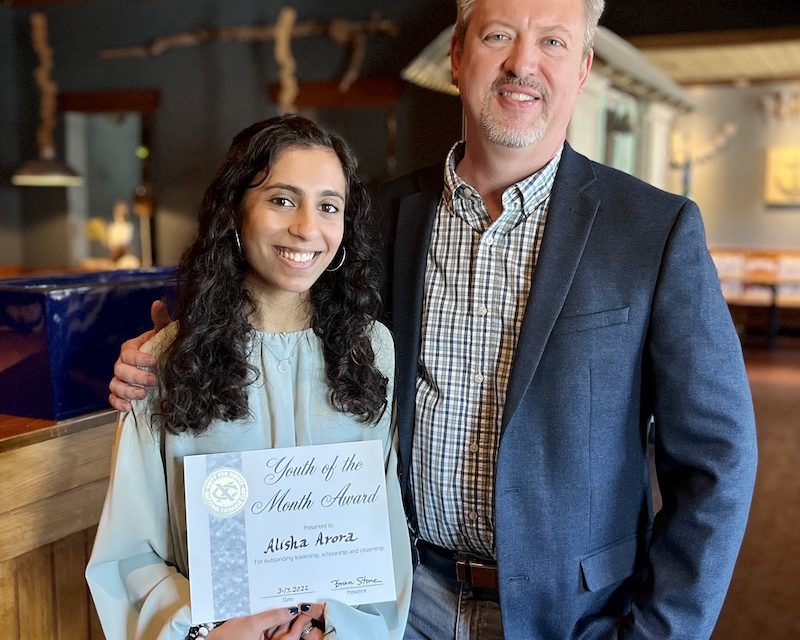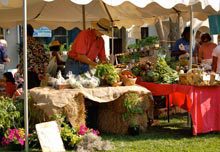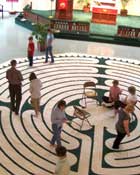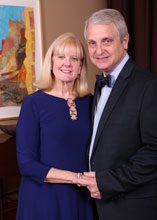Listening in on Alisha Arora and Jonathan Haupt of the Pat Conroy Literary Center
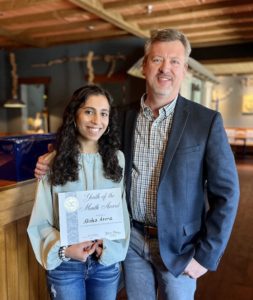
Beaufort Exchange Club Youth of the Month (for March) Alisha Arora with Jonathan Haupt
Describing multi-talented Beaufort High School senior Alisha Arora is like cataloging a whole troop of high-achievers, and not just one. Seventeen-year-old Alisha is an accomplished AP Capstone scholar and honors student, newly accepted into the prestigious genetics program at the University of Georgia. She’s also vice president of Beaufort High’s chapter of the National Honor Society, captain and MVP of the Girls Varsity Tennis Team, an active board member of DAYLO: Diversity Awareness Youth Literacy Organization, a competitive dancer (performing recently in CAPA’s Dancing with Our Stars), and a Beaufort County Library volunteer. The Beaufort-born daughter of Indian immigrants, she also assists in her family business.
In addition, Alisha is an intern of the nonprofit Pat Conroy Literary Center. In that role, she has spent the last nine months learning and teaching about the writing life of the late Pat Conroy, organizing public literary events, interviewing authors, and being interviewed herself. The internship has been an empowering journey of discovery for Alisha, and one she has taken with several of her classmates, all under the mentorship of Conroy Center executive director Jonathan Haupt.
Jonathan and Alisha were invited to interview each other about their experiences as mentor and mentee, and here is what they had to say.
JH: Alisha, my not-so-secret objective with this internship has always been about personal discovery and growth. So how have you grown?
AA: My confidence has definitely increased. Dramatically. I’ve been a dancer most of my life, so performing in front of huge crowds is a breeze for me. Speaking in front of them? Not as much. But through the internship opportunities you’ve given me, I’ve become much more confident speaking in front of people. And just with other people, too. But “people” is putting it lightly, since that has included such wonderfully talented writers whom I’ve had the chance to interview and speak with.
JH: I’m glad you’ve come to trust that you have something worth saying. Your growth in confidence and your newfound command of your leadership skills has been astounding to see, and in such a short time, too.
AA: Thank you so much!
JH: It’s all because I’m such an incredible mentor, right?
AA: You are—reputedly—the World’s Okayest Mentor.
JH: I am indeed. So, do you have any stand-out memories from your internship
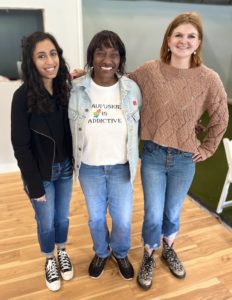
Alisha Arora, Sallie Ann Robinson & Millie Bennett
so far?
AA: Our field trip to Myrtle Beach was amazing—because we got to teach teachers. We were the only students invited to present at the SC Council of the Teachers of English Conference. Then we visited Hampton Plantation (as teenage Pat Conroy once did) on the way back. I have such great memories from those adventures.
JH: What has it been like sharing this experience with your fellow interns, Holland Perryman and Millie Bennett?
AA: It’s incredibly fun. We’ve had some wonderful conversations, and I learn so much from them, too. I’ve made great friends in the process. My internship has been more meaningful because I get to share the experience with two of my favorite people, who share the same passion for reading I do. But what’s it like for you now, mentoring three high schoolers? Is it different from working with college students?
JH: I remember the writer Jill McCorkle was once asked if being an accomplished short story writer also helped with her novels. She said that writing a short story has as much in common with writing a novel as writing a novel has in common with baking a cake. I think that metaphor applies to mentoring high school students vs. college students, too. They are radically different life experiences, but I wouldn’t trade working with the three of you for anything.
AA: So, what’s been your favorite experiences with our “intern squad?”
JH: Your superhero team-ups are the best, because you’re unstoppable together. You each have such unique abilities and remarkable talents. So, it’s been even more incredible when you present together, as we’ve done for both of our statewide English educators conferences. Or when interviewing an author together, like Kalynn Bayron (This Poison Heart) for the Bluffton Book Festival or Rebecca Hall (Wake) for March Forth. It’s always an act of trust for us to give these talks and interviews together, knowing that we can rely on one other as we take our audiences on theses journeys. But so often the real work of mentoring happens off stage, in the conversations we’ve had along the way. And that’s when I learn so much from each of you, too.
AA: Like the lyrics to every Taylor Swift song?
JH: I’m still trying to avoid that outcome. Although I’m grateful that you three have so much in common, even if that includes encyclopedic knowledge of Taylor Swift. But let’s talk about something you and I have in common: the beloved sciences.
AA: I remember that you started out as a chemistry major, then switched to English. What brought about that change?
JH: I loved chemistry when I was your age, and I thought majoring in chemistry and minoring in English would lead to a career as a technical writer or editor. I broke so many beakers. Being in the lab wasn’t for me, and as you’ll learn, organic chemistry will either make or break your passion for science. But I was also starting to find my voice as a writer, and I was winning writing contests and being published as short story writer, essayist, and poet. Those validations led me on another path, but one in which I still use the analytical and organizational skills I learned in chemistry. So now you’re headed to UGA this fall to study genetics. That must be exciting for you.
AA: I’m SUPER excited! And I’m a little nervous, too. Since elementary school, I’ve always been interested in science and in understanding how the world works. I love how everything circles back and is related to each other. Genetics helps to show that, while the world is complicated, everything is still connected, and through something so basic. It helps to make life seem a little smaller, too, less overwhelming and easier to manage.
JH: That was also the goal of our recent Beaufort Human Library collaboration. That event featured a dozen human “books” representing the diversity of Beaufort, in public conversations about their lives and assisted by a stellar group of 20 volunteer student “bookmarks” you recruited and organized. How was that for you?
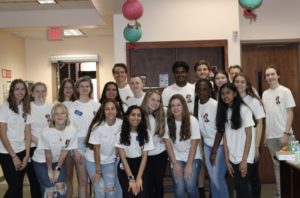
Alisha Arora (center) with the Beaufort Human Library “bookmarks”
AA: Having a leadership role in such a successful event that shared people’s diversity and their similarities here in our small town made my heart sing. Organizing the bookmarks was a little stressful and chaotic at first, but it all came together. I had a bunch of meetings with our volunteers, and there were so many texts and calls to make sure they knew what they were doing. I seem to have cultivated a “don’t mess with Alisha” reputation as a result. And that’s pretty great, honestly. Plus, I enjoyed seeing students get so invested in the Human Library, too. Coordinating my part of a big event gave me a little insight into what it’s like for you to run the Conroy Center. I wonder how that compares with what you did as director of UofSC Press.
JH: So much of being a publisher was about saying no. “No, I can’t publish your zombie romance novel. No, Oprah doesn’t want to read your scholarly monograph. No, your nephew can’t design your book cover.” It was just soul-crushingly negative sometimes. But my Conroy Center experience has been about saying yes, about being a good servant leader to writers and readers, and to my intrepid interns, in whatever ways I can. That’s the lesson of Pat’s mentorship at work in my life now: passing it on.
AA: What did it feel like to be mentored by Mr. Conroy?
JH: Pat had a way of making everyone feel special, of teaching without it seeming like teaching. That was who he was in his heart. He spotted something in me that convinced him I was worth his time, as Gene Norris, Bill Dufford, and Ann Head once did for him. I think I’m here in Beaufort now in the hopes of becoming the person Pat thought I already was. Being entrusted to mentor you and your fellow world-saving teens has been one of the best aspects of the Beaufort chapter of my life. So I’ve been teaching you about Pat’s mentors and students—and you’ve even met some of them. What was it like to talk with Pat’s high school principal Bill Dufford? And his student Sallie Ann Robinson?
AA: Meeting Dr. Dufford was so surreal. He’s been like Prof. Albus Dumbledore to generations of students. Hearing stories about the impact he and young Pat Conroy had on each other is one thing, but actually meeting him and having a conversation with him, the way he once talked to Mr. Conroy, is something I’ll never forget. Then meeting Sallie Ann Robinson on her native Daufuskie Island when we got to give a presentation there was incredible too. She’s accomplished so much, as a chef, writer, and culture keeper! I’m really looking forward to going back for her tour this summer.
JH: I’m so glad you got to meet both, and especially after we’ve presented on their vital roles in Pat’s story. We have another Conroy talk coming up soon, though: “I Was Born to Be in a Library”: Pat Conroy’s Great Love of Libraries, which we’re giving together on Tuesday, May 10, at 4:30 p.m. at the Bluffton Library. This is a special one for both of us, given our respective loves of books and libraries. Where did that begin for you?
AA: I’ve loved reading from the moment I learned how. It was just a thing I did, eagerly, no questions asked. I didn’t even realize that I was reading so much until I got older. I remember going to the library almost every week to get new books with my sister. And in elementary school, I got to help shelve books during recess. That’s how much I loved it. I skipped recess almost every day just to go to the library. I learned the Dewey Decimal system, too, which came in handy when I started volunteering at our public library in high school. Libraries are where I grew up, and books helped me on that journey.
JH: I had the benefit of some wonderful school and public librarians when I was your age. I remember checking out a picture book in elementary school, and then realizing that it didn’t have any words in it. I tried to exchange it for something else I could read, but the librarian told me that was my chance to make up a story for the book to go along with the pictures. That’s the day I was given the keys to the kingdom: the realization that I could create my own stories. What a gift that librarian gave me. And speaking of gifts, you have one we mentioned earlier which I’d like to circle back to. How long have you been a dancer?
AA: I have been dancing for 16 years now! I danced competitively for about 5 years, but I love the creative act of dance more than competing. My parents told me that I could dance before I could walk. When I did learn to walk, I walked around on my tip toes—and to this day, I still do. Being a dancer is one of the most important parts of my life. It’s how I connect myself to the world.
JH: The world is lucky to have you connected to it, Alisha. You carry yourself with such grace and intelligence. It’s a joy to guide you on this part of your journey. Thank you for this conversation, and thanks for being such an incredible and inspirational intern for our Conroy Center.
AA: Thank you for the opportunities, and for being the World’s Okayest Mentor.
Learn more about the Pat Conroy Literary Center at www.patconroyliterarycenter.org.
“I Was Born to Be in a Library” – Pat Conroy’s Great Love of Libraries
Presented by Jonathan Haupt and Alisha
Tuesday, May 10, at 4:30-5:30 p.m.
Bluffton Library, 120 Palmetto Way, Bluffton

